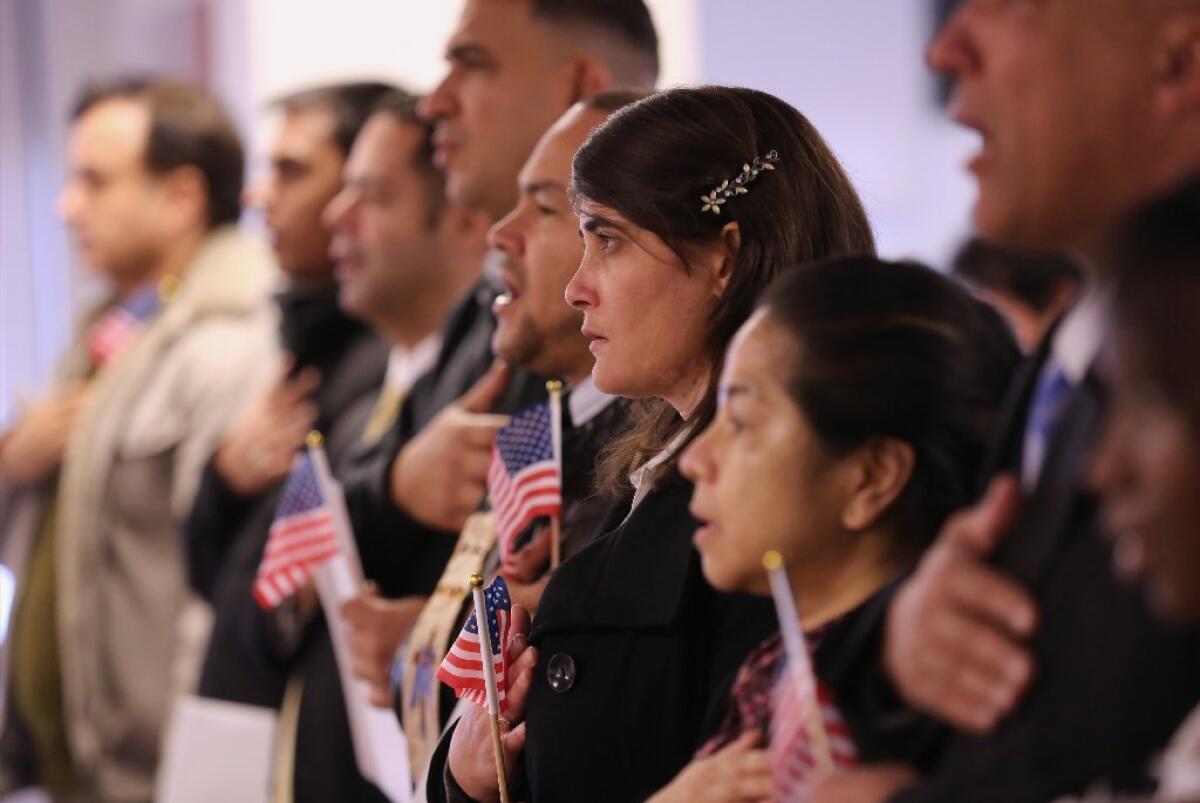Trump’s callous attack on immigrants who need public aid

- Share via
The Trump administration is moving — again — to make it more difficult for even legal immigrants to get a foothold in the United States.
Beginning in October, a new rule will make immigrants who use certain government safety-net programs ineligible for permanent residency, blocking their path to naturalized citizenship. The move, which is likely to be challenged in court, meshes with the administration’s other efforts to fundamentally change the nature of U.S. immigration from a focus on family reunification to one based on English proficiency, educational level and work experience.
Barring legal status to immigrants because they might need a little short-term assist is hardhearted, but also in stride for an administration that sees nothing wrong with incarcerating children who arrive at the border asking for help. Yet research shows that even those who do need some financial help over time learn or improve skills that move them into higher-income brackets and help the overall economy.
The new rule would make legal immigrants ineligible for green cards if they use or are deemed likely by the government to use some public benefits for more than 12 months within a 36-month period. That means legal immigrants — say, people here on student or temporary work visas — who are entitled by law and regulation to turn to public benefit programs, such as Medicaid or food stamps, may jeopardize their future legal status just by accepting help to which Congress has said they are entitled.
Immigrant rights advocates are rightfully up in arms, arguing that the new rule punishes the poor and violates immigration law. They also warn that, because of the rule’s complexity, people will avoid seeking medical help or other benefits for fear of inadvertently jeopardizing their eligibility to become permanent residents.
The Department of Homeland Security first proposed the restriction in October, eliciting more than 266,000 public comments, triple the average for most of the agency’s proposed rules. The government subsequently amended the proposal, and the version to be published Wednesday does not apply to women who receive public assistance during pregnancy or within 60 days after giving birth. It also does not penalize low-income immigrants whose premiums for Medicare Part D are subsidized by taxpayers, children up to age 21, or recipients of emergency medical assistance, aid from school lunch programs and food pantries, subsidized student loans and mortgages, temporary housing, or disaster relief, as the Associated Press reported. But the government said the changes could still affect about 382,000 immigrants a year, an estimate advocates say is too low.
We are already seeing the effects. After the rule first surfaced late last summer, immigration advocates say, they noted a drop-off in the number of people seeking assistance, most of them fearful that receiving short-term help could keep them from remaining in the country or becoming a citizen. That would not reduce immigration levels, just make the intervening years more difficult for the immigrants.
As it is, the government has a long history of rejecting visa requests and green card applications from people who are likely to become dependent on the government for subsistence. That has reasonably been interpreted to mean people who rely on cash support or people who would require institutional care. Major social service programs also are out of reach for most legal immigrants until they’ve been here for five years. And laws already bar those living here without permission from nearly all public support programs.
There is a serious discussion to be had about what our national priorities are for determining who is eligible to immigrate. For generations the focus has been on family reunification, with parents and children of U.S. citizens and legal permanent residents getting preference. The Trump administration wants to limit admission to those who already speak English, have definable skills and an education, and who will be ready to add to the economy upon arrival.
Other nations, such as Canada and Australia, have tried similar systems with varying results. But historically, immigrants from all over the world, including those who arrived not speaking the language and with little more than pocket change, have added to the American stew pot and helped fuel our prosperity.
The nation will in the coming years need more immigrants with varying levels of skills, especially as birthrates decline and our overall population ages. Policies such as the new public charge rule erect yet another wall in their way.
More to Read
A cure for the common opinion
Get thought-provoking perspectives with our weekly newsletter.
You may occasionally receive promotional content from the Los Angeles Times.






